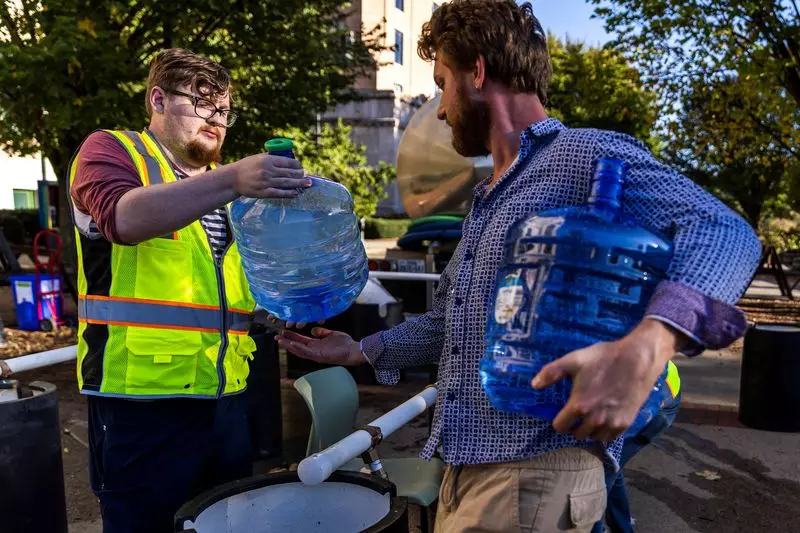In the wake of Hurricane Helene, which wreaked havoc on the southeastern United States, tens of thousands of residents in North Carolina are grappling with a critical water crisis. The storm, characterized by its powerful Category 4 winds when it made landfall in Florida, not only claimed more than 180 lives in its destructive path but also resulted in extensive infrastructure damage across several states. As recovery efforts ramp up, it is evident that the repercussions of Helene will continue to be felt for an extended period, especially in the western regions of North Carolina, where the storm’s aftermath has left approximately 20% of residents without access to running water.
The severity of the situation is highlighted by reports indicating that over a million residents remain without electricity as well. This combination of utility failures creates an alarming scenario where basic daily needs are no longer assured. In Asheville, one of the hardest-hit areas, the municipal water supply, essential for over 150,000 people, has been significantly compromised. The damage inflicted by the storm on the water treatment infrastructure means that the road to recovery is long and convoluted.
Community Efforts Amid Crisis
In the midst of adversity, community members across Asheville have come together to assist those affected by the water shortages. Pack Square Park has transformed into a hub for distribution of essential supplies, where volunteers are tirelessly working to provide clean drinking water and meals for the beleaguered population. The makeshift systems devised to deliver water, including improvised piping from tanker trucks, reveal both the ingenuity and resourcefulness of the citizens in the face of disaster.
Individuals like David Shoham, an East Tennessee State University professor, exemplify the common struggles faced by residents. His experience of relying on water reserves collected pre-storm brings into sharp focus the reality that many are forced to ration scarce resources. With normalcy disrupted, the emotional toll on residents is palpable, as frustrations mount amid an uncertain timeline for recovery.
Meanwhile, local businesses are also stepping up to help. Jordan Lance, the owner of Buxton Chicken Palace, is mobilizing his team to deliver hot meals to those in need, showcasing the community spirit that often shines brightest in times of crisis. However, there remains the looming concern about how businesses can sustain themselves without basic utilities. Lance’s fear about his establishment’s survival reflects a broader dilemma for many entrepreneurs facing prolonged water outages.
The destruction caused by Helene has laid bare the vulnerabilities of North Carolina’s water infrastructure. The storm not only devastated key treatment facilities but also wiped out main and backup pipes, creating a shortage that will take considerable time and resources to rectify. The state’s National Guard and the U.S. Army Corps of Engineers have been enlisted to aid in restoring operations, yet the road ahead promises to be fraught with difficulties.
As local authorities strategize recovery plans, the impact extends beyond immediate water shortages. The implications for schools, hospitals, and businesses cannot be overstated. Asheville City Schools Superintendent Maggie Fehrman emphasized the need for a stable water supply before students can return to classrooms, indicating the broader consequences of the crisis on education and child welfare.
President Joe Biden’s recent visit to survey the damage in North Carolina underscores the federal government’s recognition of the gravity of the situation. With search and rescue operations still active, the response to Helene’s aftermath is ongoing. The collaboration between state and federal agencies is crucial as they work to address immediate needs and plan for long-term recovery.
However, the question remains: how can communities better prepare for such disasters in the future? The vulnerability exposed by this hurricane may ignite discussions about the resilience of infrastructure systems, community preparedness, and whether current policies adequately address the implications of climate change on severe weather events.
As North Carolina navigates the aftermath of Hurricane Helene, the water crisis serves as a vivid reminder of the interconnectedness of natural disasters and the critical nature of infrastructural integrity. The resilience shown by local communities is commendable, yet it also reveals how much work remains to be done to ensure that future storms result in fewer casualties and disruptions to daily life. The road to recovery will require not just immediate aid but a reevaluation of strategies for disaster preparedness and resilience.

